News & Opinion
The 'Outing' Debate

Why it continues, and the steps we can take to break the cycle of hypocrisy
January 09 2014 8:55 PM EST
May 26 2023 1:55 PM EST
By continuing to use our site, you agree to our Private Policy and Terms of Use.

The explosion of opinions over whether "outing" is ethical was unavoidable. When hottie journalist Itay Hod posted a now famous rant on Facebook challenging fellow journalists to report on the behavior and sexuality of Illinois Congressman Aaron Schock, a Republican, the usual cycle started.
First, overwhelming comments on his post. Second, his post went viral and was picked up by the blogosphere and some mainstream media outlets. Third, the commentary came in a tsunami.
Allow me to sum it up for you: Some people support reporting on the sexuality of closeted anti-gay politicians, some people think it's really unethical, and most people don't really care enough to express an opinion.
The whole thing is a perfect example of lather, rinse, and repeat. Can we please break that cycle?
Let's be clear here. No one is discussing disclosing the sexuality of private citizens. As Itay pointed out in his post, we are discussing the responsibility of journalists to report newsworthy stories. That would include elected officials, celebrities, media figures, and anyone else who is willing to put their lives under public scrutiny.
The media reports on the private lives of such people all the time. Have you picked up US Weekly or People magazine, well, ever? How about the common reporting on who any given public figure is dating, where they had dinner, who they hung out with for drinks after and whether they were seen leaving together? I surely don't see objections abound about this kind of reporting. To the contrary, my Facebook feed is crammed with references to such magazines being guilty pleasures.
Michelangelo Signorile writes at Huffington Post about the origination of the term "outing." A closeted media critic at Time magazine coined the term. It served as a personal defense mechanism by setting a standard for reporting by journalists. This defensive posture has been employed ever since and has become a common standard among journalists and LGBT organizations.
Personally, I think "outing" has been a convenient excuse for journalists to be lazy. Every single day, editors and reporters decide which stories are newsworthy, which ones are too volatile and which ones are not newsworthy. The sexuality of a member of Congress may be newsworthy for a number of reasons. First, living a closeted life is lying to the public and the media. That is newsworthy unless you think it is OK for elected officials to lie. Also, we know there can be many negative consequences to living in the closet, such as alcoholism, drug use, higher rates of suicide and extreme efforts to keep sexuality a secret, which may run afoul of laws or ethics rules.
When I was involved in exposing the hypocritical behavior of former Congressman Mark Foley, I did not consider that "outing." But lots of people did. That's an example of the term "outing" promoting laziness among the general public when discussing these issues.
We don't have specific terms that prevent the media from reporting on public figures that are going to rehab, going through a breakup, getting treatment for a sickness, or a multitude of other things about their private lives. This is the kind of society we live in. The general public is interested in the private lives of public figures. When one of those figures is in a position to vote on issues that is specifically related to his private life, I believe it adds an extra layer of burden on a journalist to report on it.
If LGBT people want to talk about equality under the law and equal treatment by the media, then why is there even a debate about whether to report on the hypocrisy of closeted politicians that have anti-gay voting records? Those people no longer deserve the shield of a term coined by a closeted journalist who only sought self-preservation in an earlier era.
It's time for reporters, editors and producers to do the research and make informed decisions on whether something warrants reporting to the public. This should never have been an ongoing cycle of debate within the LGBT community when the real issue is that the media has been lazy and hiding behind something that conveniently allowed them to not properly do their jobs.